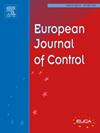Quasi-data-driven static output feedback control of linear systems with input and state delays
IF 2.6
3区 计算机科学
Q2 AUTOMATION & CONTROL SYSTEMS
引用次数: 0
Abstract
This paper presents a quasi-data-driven static output feedback (SOF) control framework for discrete-time linear systems subject to time-varying state and input delays. The proposed controller synthesis leverages input-state-output data acquired from the open-loop system, integrated with delay-dependent data-based Linear Matrix Inequality (LMI) conditions derived using Lyapunov–Krasovskii stability theory. A salient feature of this methodology is its ability to compute controller gains without prior knowledge of the system dynamics, thereby eliminating the dependence on explicit mathematical models. Furthermore, a data-driven reference-tracking input scheme is developed for time-delay systems, addressing piecewise-constant reference trajectories while guaranteeing asymptotic stability of the tracking error. The efficacy of the proposed approach is rigorously validated through numerical simulations and also experimental implementation on a twin-rotor system for pitch angle tracking, demonstrating robust performance in both theoretical and practical settings.
具有输入和状态延迟的线性系统的准数据驱动静态输出反馈控制
针对具有时变状态和输入时滞的离散线性系统,提出了一种准数据驱动的静态输出反馈控制框架。所提出的控制器综合利用从开环系统获取的输入-状态-输出数据,结合使用Lyapunov-Krasovskii稳定性理论导出的基于延迟相关数据的线性矩阵不等式(LMI)条件。这种方法的一个显著特点是它能够在不事先了解系统动力学的情况下计算控制器增益,从而消除对显式数学模型的依赖。此外,针对时滞系统,提出了一种数据驱动的参考跟踪输入方案,在保证跟踪误差渐近稳定的同时,解决了分段常数参考轨迹的问题。通过数值模拟和双转子系统俯仰角跟踪实验验证了该方法的有效性,在理论和实际设置中都证明了该方法的鲁棒性。
本文章由计算机程序翻译,如有差异,请以英文原文为准。
求助全文
约1分钟内获得全文
求助全文
来源期刊

European Journal of Control
工程技术-自动化与控制系统
CiteScore
5.80
自引率
5.90%
发文量
131
审稿时长
1 months
期刊介绍:
The European Control Association (EUCA) has among its objectives to promote the development of the discipline. Apart from the European Control Conferences, the European Journal of Control is the Association''s main channel for the dissemination of important contributions in the field.
The aim of the Journal is to publish high quality papers on the theory and practice of control and systems engineering.
The scope of the Journal will be wide and cover all aspects of the discipline including methodologies, techniques and applications.
Research in control and systems engineering is necessary to develop new concepts and tools which enhance our understanding and improve our ability to design and implement high performance control systems. Submitted papers should stress the practical motivations and relevance of their results.
The design and implementation of a successful control system requires the use of a range of techniques:
Modelling
Robustness Analysis
Identification
Optimization
Control Law Design
Numerical analysis
Fault Detection, and so on.
 求助内容:
求助内容: 应助结果提醒方式:
应助结果提醒方式:


